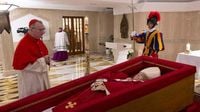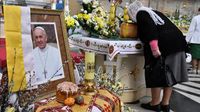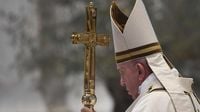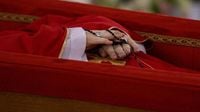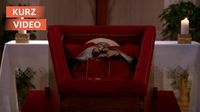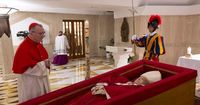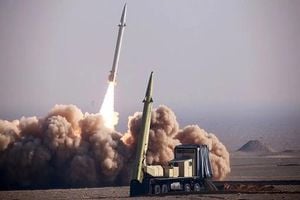Pope Francis has passed away at the age of 88, leaving behind a legacy that spanned over a decade as the head of the Roman Catholic Church. The announcement of his death came on Easter Monday, April 21, 2025, just a day after he delivered the Easter blessing to thousands of faithful gathered in St. Peter's Square.
In a significant change to traditional practices, his funeral is set to take place on Saturday, April 26, 2025, at 10:00 AM in the Basilica Santa Maria Maggiore, rather than the more customary location of St. Peter's Basilica. This decision aligns with Pope Francis's wishes for a simpler burial, reflecting his desire to be remembered as a shepherd of the Church rather than a worldly authority.
Italy has declared a five-day state of mourning, with flags at public buildings flying at half-mast. The government, led by Prime Minister Giorgia Meloni, has implemented strict security measures in anticipation of the numerous heads of state expected to attend the funeral. Among them is U.S. President Donald Trump, who has confirmed his attendance, along with leaders from around the world, including French President Emmanuel Macron and Ukrainian President Volodymyr Zelenskyy.
Pope Francis, born Jorge Mario Bergoglio in Buenos Aires on December 17, 1936, had been battling health issues, including a severe lung infection and kidney failure, prior to his passing. His death certificate, released by the Vatican, indicated that he died from a stroke, which resulted in a coma and irreversible cardiovascular collapse.
Following his death, the body of Pope Francis was placed in state in the chapel of his residence, Casa Santa Marta, where it remains accessible to cardinals, curial officials, and Vatican staff. The public will have the opportunity to pay their respects starting Wednesday, April 23, 2025, when the body is transferred to St. Peter's Basilica.
In a departure from the elaborate traditions of previous papal funerals, Pope Francis had requested a more modest burial arrangement. Instead of the traditional triple coffin made of wood, lead, and zinc, he will be laid to rest in a simple wooden coffin with a zinc lining. This reflects his expressed desire for a burial "with dignity, like any Christian, but not on cushions," as he stated in his interview book, "El sucesor."
Furthermore, his choice of burial site in the Basilica Santa Maria Maggiore marks a notable shift in papal traditions. This basilica, located near Rome's main train station, has not hosted a papal burial in over 350 years. In his will, Pope Francis specified that his grave should be unadorned, bearing only the name "Franciscus."
As the preparations for the funeral continue, the Cardinals gathered in the Vatican on April 22, 2025, to finalize the details of the memorial service and the subsequent conclave to elect his successor. The conclave is expected to take place between May 5 and May 10, 2025, following the customary period of mourning known as "Sedisvakanz," which occurs after the death of a pope.
In light of his passing, many leaders and public figures have expressed their condolences. Former U.S. Presidents Bill and Hillary Clinton released a statement honoring Pope Francis's commitment to peace, economic integration, and social justice. They highlighted his unique ability to embrace people of all backgrounds and faiths, emphasizing the importance of compassion and coexistence in global politics.
In addition to political figures, leaders from various religious and cultural backgrounds have also paid tribute to the late pope. The Chinese government expressed its condolences, reiterating its commitment to improving relations with the Vatican, a relationship that had seen significant thawing under Pope Francis's leadership.
As the world mourns the loss of Pope Francis, many reflect on his transformative impact on the Catholic Church and his unwavering dedication to the marginalized and the poor. His papacy was characterized by a focus on social justice, environmental issues, and interfaith dialogue, which resonated with millions around the globe.
Despite facing criticism for some of his policies and decisions, Pope Francis remained a beloved figure for many, known for his humility and approachability. His final public appearance just a day before his death encapsulated his commitment to his flock, as he expressed gratitude for being able to connect with the faithful one last time.
The upcoming funeral will not only serve as a farewell to a significant religious leader but also as a moment for the Catholic community and the world to reflect on the values he championed throughout his life. As preparations unfold, the legacy of Pope Francis will undoubtedly continue to inspire future generations.
In the wake of his death, discussions regarding potential successors are already underway, with various Cardinals being considered for the papacy. The diverse backgrounds and perspectives of the Cardinals may lead to a more complex and potentially prolonged conclave, as the Church navigates the future following the impactful tenure of Pope Francis.
As the international community comes together to honor Pope Francis, the world is reminded of the enduring power of faith, compassion, and the pursuit of peace, values that he tirelessly advocated for during his time as the leader of the Catholic Church.
